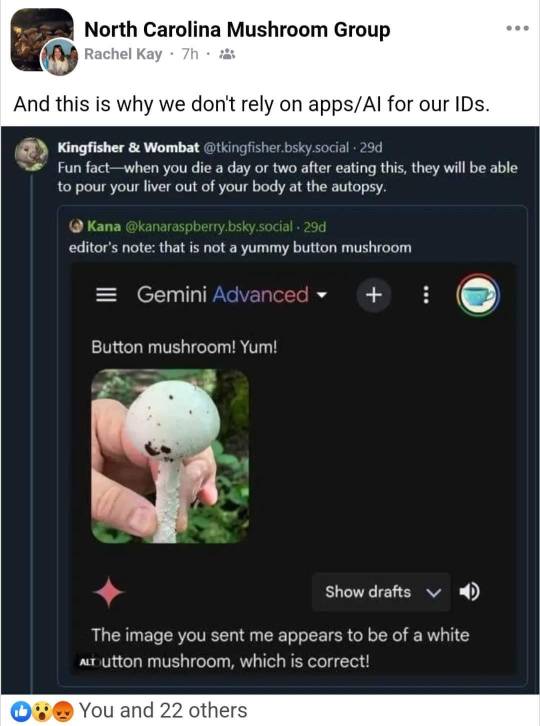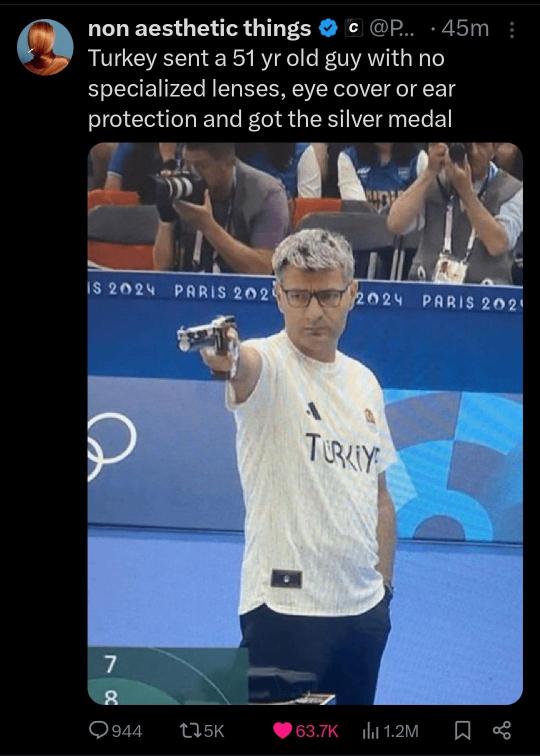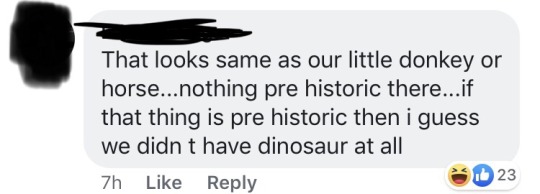this is just a collection of awesome or interesting corrections of people being WRONG on the internet because i like that kind of thing ~*~ seen a neat correction? please @ohnofixit or drop a link in our submit or ask box! ~*~ curlicuecal ~*~ our philosophy
Don't wanna be here? Send us removal request.
Text
I am fucking BEGGING people to include proper sources when talking about news and current events. A screenshot of a headline or a social media post is not a proper source.
4K notes
·
View notes
Text
I'm sure false etymology posts aren't like actually more common than any other type of misinformation on this website, it just happens to be a type of misinformation I'm better at spotting and a type of misinformation that shows up in the type of posts people I follow tend to reblog. but dang false etymology posts sure are common
4K notes
·
View notes
Text
This is inaccurate (these are typically smishing links with no evidence they have ever had anything to do with trafficking). Spreading misinformation and fear mongering is harmful to accurately informing people about real safety issues.
WARNING!!!!

People, please be careful. There are also people tracking children and people and putting bids on them based on their profile pictures on whatsapp, tracking and kidnapping them. Especially young children, so please be cautious, especially parents who have their children as their profile pictures.
Please pass this on to everyone so that they are aware of the danger. I don’t how it is all around the world but I know it can’t just be here so please please spread the word. Thank you.
266K notes
·
View notes
Text

For those not in the know, this is one of the Amanita mushrooms referred to as a Destroying Angel. Never, ever, ever, ever forage with an app. Especially for mushrooms.
138K notes
·
View notes
Note
I understand that vaccines are proven to work and are a great advancement in our medicine, and also that homeopathic remedies don't work, but don't they work on the same principal? Why does one work and the other doesnt?
They do not work on the same principle.
I can see how vaccines look like a "like treats like" situation, but in homeopathy "like treats like" is a kind of magical thinking.
Let's take an example from Chicken Pox, a virus for which there is an effective vaccine and for which there is a common homeopathic treatment.
Chicken pox infects people once, and it is extremely rare to get a second case because once you have had it, your body forms persistent antibodies against the varicella-zoster virus. When I was a kid, they didn't have a vaccine for this, so kids mostly got chicken pox once and it ran around whole schools and that was it. It's a virus that is fairly minor in children, though it can cause dangerously high fevers. Adults who get chicken pox typically get much sicker than children who get it, and it can lead to permanent harms like infertility in adults who get it. Because it can be so dangerous, we don't want people to risk getting it, so we vaccinate.
The way the vaccine works is that it takes a weakened form of the virus and introduces that into the body of a person with a healthy immune system. The immune system responds and the person who got the vaccine may get some minor symptoms, like a headache or a slight fever, but it will be nowhere near as severe as getting actual chicken pox would be. Because the immune system was exposed to the virus and responded, it now has antibodies against the virus that recognize the virus and respond immediately before it can start replicating in the body. If a person who has either previously had chicken pox or who has been vaccinated against it is exposed to the chicken pox virus, their body uses those antibodies to react to the virus and protect against a systemic infection.
Are you familiar with Star Trek? It's kind of like the Borg. You can't use the same attack pattern against the Borg multiple times because if you do, they'll recognize the pattern and will be able to defend against it. The virus is the attacker, and your immune system is the Borg. It knows what it's looking for and won't let anything get through its defenses.
Homeopathic remedies don't seek to prevent illness or provoke an immune response, they seek to cancel out something that is happening in the body.
For chicken pox, which produces itchy red bumps, homeopaths use Rhus Tox - a dilution of poison ivy, a plant that causes itchy red bumps if you encounter it in nature. The Rhus Tox didn't cause the chicken pox, it's not given to prevent the virus, it's from a plant that is completely unrelated to the virus that happens to produce some of the same symptoms as the virus when you touch it.
They don't even think that the Rhus Tox will provoke an immune response from your body like actually touching poison ivy would, they're attempting to use an unrelated compound (that is so diluted that it isn't even present in the preparation) in place of your immune system to attack the itchy red bumps.
So I'm going to go over this in a few brief points:
Vaccines are preventative ONLY, they are not a treatment for illness or symptoms of an illness
Vaccines work by introducing your immune system to a partial, weakened, or dead virus so that your immune system can form antibodies against that virus and prevent that virus from replicating in your body when it is later exposed to a whole/strong/live virus.
Different vaccines have different levels of effectiveness and produce different lengths of immunity; this is for a number of reasons, but if you get a measles shot as a kid you may only ever need one booster, while you need a flu shot every year and a tetanus shot every decade. All of them work the same way, though: they show your immune system what a virus looks like so that your immune system can kill the virus.
That is why immune compromised people sometimes can't be vaccinated, or why vaccines don't work as well for them or may need higher doses or more boosters. Because they don't have a healthy immune system, weakened viruses like the ones in the chickenpox virus might be too strong for their immune system to fight, and even if it doesn't get them sick, their bodies may not be able to produce enough effective antibodies to protect them from the virus in the future. That's part of why it's important for as many people to be vaccinated as possible; the more people who are vaccinated, the harder it is for viruses to spread, and vulnerable people like immune compromised people or babies too young for vaccination won't be exposed to deadly viruses.
Homeopathy, on the other hand, aims to treat symptoms of an illness that a person is already experiencing.
Homeopathic treatments do not aim to provoke an immune response, they aim to cancel out a symptom with a cure.
Dilution is a very important part of homeopathy, with homeopaths claiming that the more diluted a preparation is the stronger it is. This is simply incorrect; I don't know how to make a more logical explanation of that, it is just wrong that less of a substance causes more of a response.
Homeopathy says "like treats like" and that may seem like using a vaccine with a weak virus to prevent infection from a strong virus, but their version of "like" is different - Rhus Tox (poison ivy) is supposed to be "like" chicken pox because both cause itching. Rhus tox is also supposed to treat PCOS, erectile dysfunction, uterine prolapse, sunken eyes, nausea, and backache. "Like" can have an extremely broad meaning in homeopathy, which should be cause for suspicion.
Here's a paper that compared the immune response of college students given homeopathic "vaccines" against a control group and against a group of students who were given standard medical vaccines. The control group and the homeopathic group both did not have an immune response in titer tests, while the vaccination group did have an immune response, demonstrating that they had protection from the vaccinated viruses. It's a pretty good demonstration both of how effective homeopathy is (not at all) as well as how to set up a fair and ethical study to look at the effectiveness of different kinds of treatments.
13K notes
·
View notes
Text
68K notes
·
View notes
Text
I know this happens and it looks suspicious but

this image? we have every reason to think it is a cucumber, like it was made in clay models in burials period, it's painted green, it's on the small side of things (9.6 cm or 3 3/4 inch)
oh right and it was placed on a model offering table with small model bread and drinking cup

sometimes a cucumber really is a cucumber.
60K notes
·
View notes
Text
found ANOTHER way more in-dept thread about Khao Kheow zoo to share. once again I'm obligated to put it here
my other post about this









full screenshot here I also posted this reddit thread on my other post linked above






TL;DR: Please don't trust random (may I add racist?) foreigners on the internet over locals who actually knows what they're talking about. thank you 🙇♂️
17K notes
·
View notes
Text

This used to haunt me so I'm so glad I know this now
40K notes
·
View notes
Text


This is frustrating.
I love the comparison, but I hate how they are comparing.
They are acting like she is using optics to give herself an advantage. But the device she is wearing is just for comfort and essentially does the same thing as closing one eye and squinting the other.
The little thing over the left eye is basically like an eye patch.
And the thing over her right eye is a mechanical iris, like in a camera lens, but it is NOT a lens.

Different lighting environments are going to be brighter or darker and you may have to squint more or less to let in the same amount of light into your eye. Squinting allows the shooter to get the sharpest possible vision in order to shoot a bullseye the size of a 12-point Times New Roman period.
But if you have to squint for hours for practice and in competition, this can strain your face muscles and become uncomfortable. So this iris basically squints for you.
It's more like wearing comfortable shoes so your feet do not hurt than a lens magnifying the target and giving an advantage.
Both athletes have access to these items. One felt more comfortable without them. The other didn't feel like getting a muscle cramp from squinting all day.
Either would have shot the same if they had or had not used these devices.
Just a funny difference in gear preference.
I should also add, the Turkish dad is the only one using lenses.
142K notes
·
View notes
Text
if I've learned anything from grad school it's to check your sources, and this has proven invaluable in the dozens of instances when I've had an MBA-type try to tell me something about finances or leadership. Case in point:

Firefox serves me clickbaity articles through Pocket, which is fine because I like Firefox. But sometimes an article makes me curious. I'm pretty anal about my finances, and I wondered if this article was, as I suspected, total horseshit, or could potentially benefit me and help me get my spending under control. So let's check the article in question.
It mostly seems like common sense. "...track expenses and income for at least a month before setting a budget...How much money do I have or earn? How much do I want to save?" Basic shit like that. But then I get to this section:

This sounds fucking made up to me. And thankfully, they've provided a source to their claim that "research has repeatedly shown" that writing things down changes behavior. First mistake. What research is this?

Forbes, naturally, my #1 source for absolute dogshit fart-sniffing financial schlock. Forbes is the type of website that guy from high school who constantly posts on linkedin trawls daily for little articles like this that make him feel better about refusing to pay for a decent package for his employees' healthcare (I'm from the United States, a barbaric, conflict-ridden country in the throes of civil unrest, so obsessed with violence that its warlords prioritize weapons over universal medical coverage. I digress). Forbes constantly posts shit like this, and I constantly spend my time at leadership seminars debunking poor consultants who get paid to read these claims credulously. Look at this highlighted text. Does it make sense to you that simply writing your financial goals down would result in a 10x increase in your income? Because if it does, let me make you an offer on this sick ass bridge.
Thankfully, Forbes also makes the mistake of citing their sources. Let's check to see where this hyperlink goes:

SidSavara. I've never heard of this site, but the About section tells me that Sid is "a technology leader who empowers teams to grow into their best selves. He is a life-long learner enjoys developing software, leading teams in delivering mission critical projects, playing guitar and watching football and basketball."
That doesn't mean anything. What are his LinkedIn credentials? With the caveat that anyone can lie on Linkedin, Mr. Savara appears to be a Software Engineer. Which is fine! I'm glad software engineers exist! But Sid's got nothing in his professional history which suggests he knows shit about finance. So I'm already pretty skeptical of his website, which is increasingly looking like a personal fart-huffing blog.
The article itself repeats the credulous claim made in the Forbes story earlier, but this time, provides no link for the 3% story. Mr. Savara is smarter than his colleages at Forbes, it's much wiser to just make shit up.
HOWEVER. I am not the first person to have followed this rabbit hole. Because at the very top of this article, there is a disclaimer.

Uh oh!
Sid's been called out before, and in the follow up to this article, he reveals the truth.

You can guess where this is going.


So to go back to the VERY beginning of this post, both Pocket/Good Housekeeping and Forbes failed to do even the most basic of research, taking the wild claim that writing down your budget may increase your income by 10x on good faith and the word of a(n admittedly honest about his shortcomings) software engineer.
Why did I spend 30 minutes to make a tumblr post about this? Mostly to show off how smart I am, but also to remind folks of just how flimsy any claim on the internet can be. Click those links, follow those sources, and when the sources stop linking, ask why.
20K notes
·
View notes

















